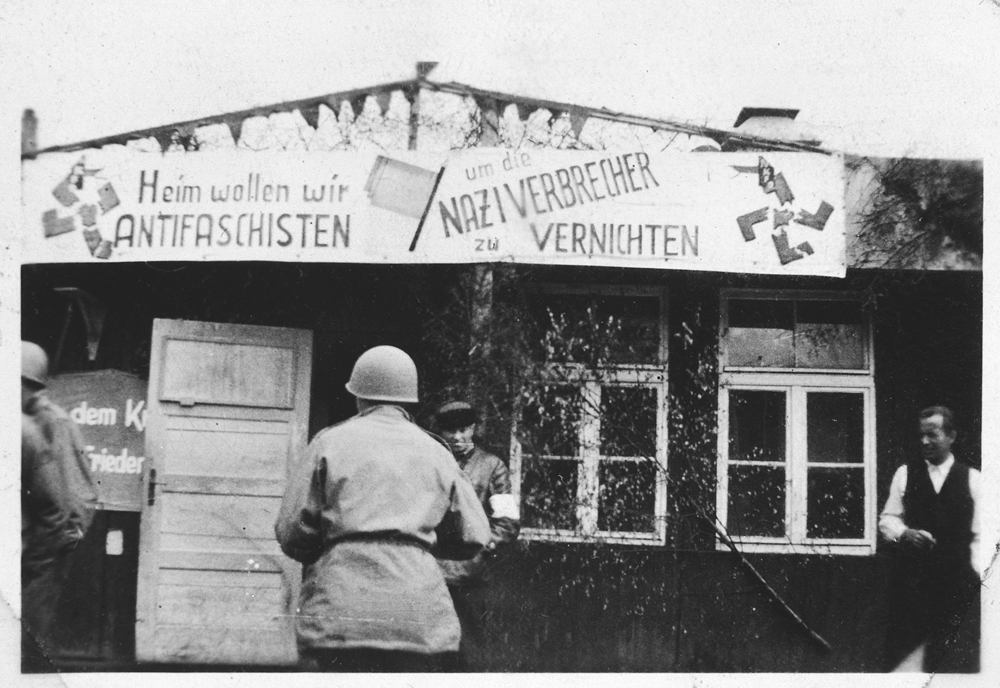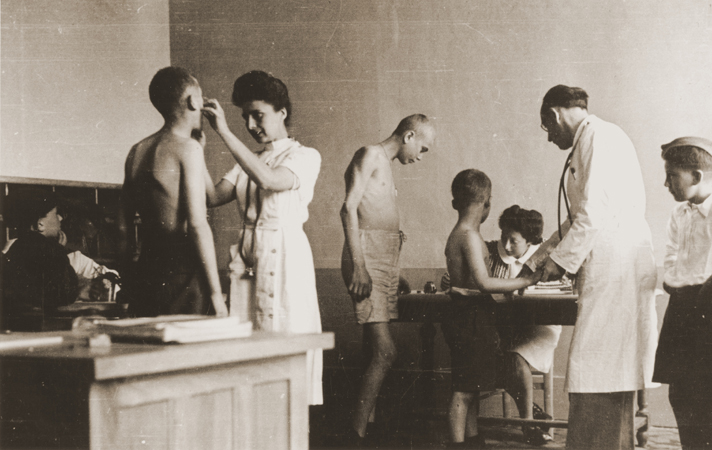|
Buchenwald Resistance
The Buchenwald Resistance was a resistance group of prisoners at Buchenwald concentration camp. It involved Communists, Social Democrats, and people affiliated with other political parties, unaffiliated people, and both Jews and Christians. Because Buchenwald prisoners came from a number of countries, the Resistance was also international. Members tried to sabotage Nazi efforts where they could, worked to save the lives of child inmates, and in the last days of the camp, with many Nazis fleeing the approaching allied troops, tried to gain control of the camp itself. After liberation, the prisoners documented their experiences on paper and formed an international committee to look after the welfare of survivors. Forms of resistance Certain administrative duties in the concentration camps were given by the SS to "prisoner functionaries". Originally, these tasks were assigned to criminal prisoners, but after 1939, political prisoners began to displace the criminal prisoners,Bi ... [...More Info...] [...Related Items...] OR: [Wikipedia] [Google] [Baidu] |
Buchenwald Anti-Nazi Banner 73316
Buchenwald (; literally ' beech forest') was a Nazi concentration camp established on hill near Weimar, Germany, in July 1937. It was one of the first and the largest of the concentration camps within Germany's 1937 borders. Many actual or suspected communists were among the first internees. Prisoners came from all over Europe and the Soviet Union—Jews, Poles and other Slavs, the mentally ill and physically disabled, political prisoners, Romani people, Freemasons, and prisoners of war. There were also ordinary criminals and sexual "deviants". All prisoners worked primarily as forced labor in local armaments factories. The insufficient food and poor conditions, as well as deliberate executions, led to 56,545 deaths at Buchenwald of the 280,000 prisoners who passed through the camp and its 139 subcamps. The camp gained notoriety when it was liberated by the United States Army in April 1945; Allied commander Dwight D. Eisenhower visited one of its subcamps. From August 19 ... [...More Info...] [...Related Items...] OR: [Wikipedia] [Google] [Baidu] |
Dora-Mittelbau
Mittelbau-Dora (also Dora-Mittelbau and Nordhausen-Dora) was a Nazi concentration camp located near Nordhausen in Thuringia, Germany. It was established in late summer 1943 as a subcamp of Buchenwald concentration camp, supplying slave labour from many Eastern countries occupied by Germany (including evacuated survivors of eastern extermination camps), for extending the nearby tunnels in the Kohnstein and for manufacturing the V-2 rocket and the V-1 flying bomb. In the summer of 1944, ''Mittelbau'' became an independent concentration camp with numerous subcamps of its own. In 1945, most of the surviving inmates were sent on death marches or crammed in trains of box-cars by the SS. On 11 April 1945, US troops freed the remaining prisoners. The inmates at Dora-Mittelbau were treated in a brutal and inhumane manner, working 14-hour days and being denied access to basic hygiene, beds, and adequate rations. Around one in three of the roughly 60,000 prisoners who were sent to Dora-M ... [...More Info...] [...Related Items...] OR: [Wikipedia] [Google] [Baidu] |
The Boys Of Buchenwald
''The Boys of Buchenwald'' is a 2002 documentary film produced by Paperny Films that examines how the child survivors of the Buchenwald concentration camp had to integrate themselves back into normal society after having experienced the brutality of the Holocaust. The documentary features interviews with the survivors, including Elie Wiesel. Plot Over four hundred orphans from Buchenwald were sent to an orphanage in Écouis, France, where they were educated and cared for. The documentary follows the orphans, who are now old men, as they re-unite on the 55th anniversary of the liberation of Buchenwald by the American army. The now-elderly men all agree that their friendships in the orphanage made the tremendous losses they suffered more manageable. "I had just lost my father, and I had witnessed my brother's murder right next to me", one survivor says, addressing his best friend. "And then I met you. You were a godsend." The inhuman treatment they had received in the concentrat ... [...More Info...] [...Related Items...] OR: [Wikipedia] [Google] [Baidu] |
Walter Vielhauer
Walter Vielhauer (; April 1, 1909 in Reutlingen - April 19, 1986 in Heilbronn) was a communist and anti-fascist of Heilbronn who was held captive by Nazi Germany before and during World War II. He was first arrested in March 1933 and was held several weeks at the new concentration camp Heuberg. After his release, he continued his struggle against fascism and in autumn of 1933, he was arrested again. He was condemned to five and a half years in penintentiary, which he had to spend in solitary confinement. After serving his sentence, he was sent to various concentration camps, Welzheim, Dachau, Mauthausen and Buchenwald, where he was active with the Resistance activities there. In June 1945, he was deployed by the United States Army The United States Army (USA) is the land warfare, land military branch, service branch of the United States Armed Forces. It is one of the eight Uniformed services of the United States, U.S. uniformed services, and is designated as the Army o . ... [...More Info...] [...Related Items...] OR: [Wikipedia] [Google] [Baidu] |
Rudi Supek
Rudi Supek (Zagreb, 8 April 1913 – Zagreb, 2 January 1993) was a Croatian sociologist, philosopher and a member of the Praxis School of Marxism. Supek studied philosophy in Zagreb and graduated in 1937. He went to study clinical psychology in Paris, where he was when World War II erupted. He joined the resistance movement, but soon was captured and deported to the Buchenwald concentration camp, where he took part in the Buchenwald Resistance. After the liberation, Supek went back to Paris to continue living and studying there. In 1948, after the Informbiro Resolution against Josip Broz Tito's Yugoslavia, the leader of the French Communists Maurice Thorez asked Supek, who was a member of the French Communist Party, to attack Titoism. Supek refused to comply and returned to Yugoslavia. However, he did not become a member of the Communist Party of Yugoslavia. Supek earned his PhD from the Sorbonne in 1952 and started to work as a professor at the Department of Psychology of t ... [...More Info...] [...Related Items...] OR: [Wikipedia] [Google] [Baidu] |
Marcel Paul
Marcel Paul (12 July 1900, Paris — 11 November 1982) was a French trade unionist and communist politician. He was also a Nazi concentration camp survivor and later served as a member of the French parliament. Biography Marcel Paul was a foundling.Biography of Marcel Paul Assemblée Nationale, official website. Retrieved February 10, 2011. His birthday is given as 12 July 1900, the date he was found in the 14th in Paris. He began working at age 13, and became politically active at the age of 15 with youth ... [...More Info...] [...Related Items...] OR: [Wikipedia] [Google] [Baidu] |
Otto Horn
Otto is a masculine German given name and a surname. It originates as an Old High German short form (variants ''Audo'', '' Odo'', ''Udo'') of Germanic names beginning in ''aud-'', an element meaning "wealth, prosperity". The name is recorded from the 7th century ( Odo, son of Uro, courtier of Sigebert III). It was the name of three 10th-century German kings, the first of whom was Otto I the Great, the first Holy Roman Emperor, founder of the Ottonian dynasty. The Gothic form of the prefix was ''auda-'' (as in e.g. '' Audaþius''), the Anglo-Saxon form was ''ead-'' (as in e.g. '' Eadmund''), and the Old Norse form was '' auð-''. The given name Otis arose from an English surname, which was in turn derived from ''Ode'', a variant form of ''Odo, Otto''. Due to Otto von Bismarck, the given name ''Otto'' was strongly associated with the German Empire in the later 19th century. It was comparatively frequently given in the United States (presumably in German American families) ... [...More Info...] [...Related Items...] OR: [Wikipedia] [Google] [Baidu] |
Edward A
Edward is an English language, English given name. It is derived from the Old English, Anglo-Saxon name ''Ēadweard'', composed of the elements ''wikt:ead#Old English, ēad'' "wealth, fortune; prosperous" and ''wikt:weard#Old English, weard'' "guardian, protector”. History The name Edward was very popular in Anglo-Saxon England, but the rule of the House of Normandy, Norman and House of Plantagenet, Plantagenet dynasties had effectively ended its use amongst the upper classes. The popularity of the name was revived when Henry III of England, Henry III named his firstborn son, the future Edward I of England, Edward I, as part of his efforts to promote a cult around Edward the Confessor, for whom Henry had a deep admiration. Variant forms The name has been adopted in the Iberian Peninsula#Modern Iberia, Iberian peninsula since the 15th century, due to Edward, King of Portugal, whose mother was English. The Spanish/Portuguese forms of the name are Eduardo and Duarte (name), Duarte ... [...More Info...] [...Related Items...] OR: [Wikipedia] [Google] [Baidu] |
Egon W
Egon is a variant of the male given name Eugene. It is most commonly found in Austria, the Czech Republic, Germany, Estonia, Hungary, Slovakia, Sweden, Denmark, and parts of the Netherlands and Belgium. The name can also be derived from the Germanic element ''egin'' which means "sword, blade". Egon may refer to: People * Egon VIII of Fürstenberg-Heiligenberg (1588–1635), Imperial Count of Fürstenberg-Heiligenberg (1618–1635) and a military leader in the Thirty Years' War * Egon Bahr (1922–2015), German politician * Egon Bondy (1930–2007), Czech philosopher * Egon Coordes (born 1944), German footballer and coach * Egon Eiermann (1904–1970), German architect * Egon Franke (fencer) (born 1935), Polish Olympic fencer * Egon Franke (politician) (1913–1995), German politician * Egon Frid (born 1957), Swedish politician * Egon Friedell (1878–1938), Austrian writer * Egon Freiherr von Eickstedt (1892-1965), German physical anthropologist * Egon Guttman(1927-2021), Ger ... [...More Info...] [...Related Items...] OR: [Wikipedia] [Google] [Baidu] |
Westview Press
Taylor & Francis Group is an international company originating in England that publishes books and academic journals. Its parts include Taylor & Francis, Routledge, F1000 Research or Dovepress. It is a division of Informa plc, a United Kingdom–based publisher and conference company. Overview The company was founded in 1852 when William Francis joined Richard Taylor in his publishing business. Taylor had founded his company in 1798. Their subjects covered agriculture, chemistry, education, engineering, geography, law, mathematics, medicine, and social sciences. Francis's son, Richard Taunton Francis (1883–1930), was sole partner in the firm from 1917 to 1930. In 1965, Taylor & Francis launched Wykeham Publications and began book publishing. T&F acquired Hemisphere Publishing in 1988, and the company was renamed Taylor & Francis Group to reflect the growing number of imprints. Taylor & Francis left the printing business in 1990, to concentrate on publishing. In 1998 ... [...More Info...] [...Related Items...] OR: [Wikipedia] [Google] [Baidu] |
Walter Bartel
Walter Bartel (15 September 1904 – 16 January 1992) was a German Communism, communist resistance fighter, historian and university professor. Life Born in Fürstenberg/Havel, Bartel grew up in a working-class family. Wilhelm Bartel, his father, worked in forestry. Walter Bartel trained to be a merchant after attending Volksschule and Realschule. He joined the Young Communist League of Germany (KJVD) in 1920 (the same year it was created) and joined the Communist Party of Germany (KPD) in 1923. In 1927 he led the German delegation to the International Youth Congress in Moscow. In 1929 he began to study Marxism-Leninism at the Moscow International Lenin School and achieved the degree of ''Aspirantur'' there. He returned to Germany in 1932. Here he participated in political resistance to the rising power of Fascism. On account of this illegal activity, he was charged with "Preparation for Treason" and sentenced to 27 months in a ''Prisons in Germany#Previous types of prisons, Z ... [...More Info...] [...Related Items...] OR: [Wikipedia] [Google] [Baidu] |






.jpg)
